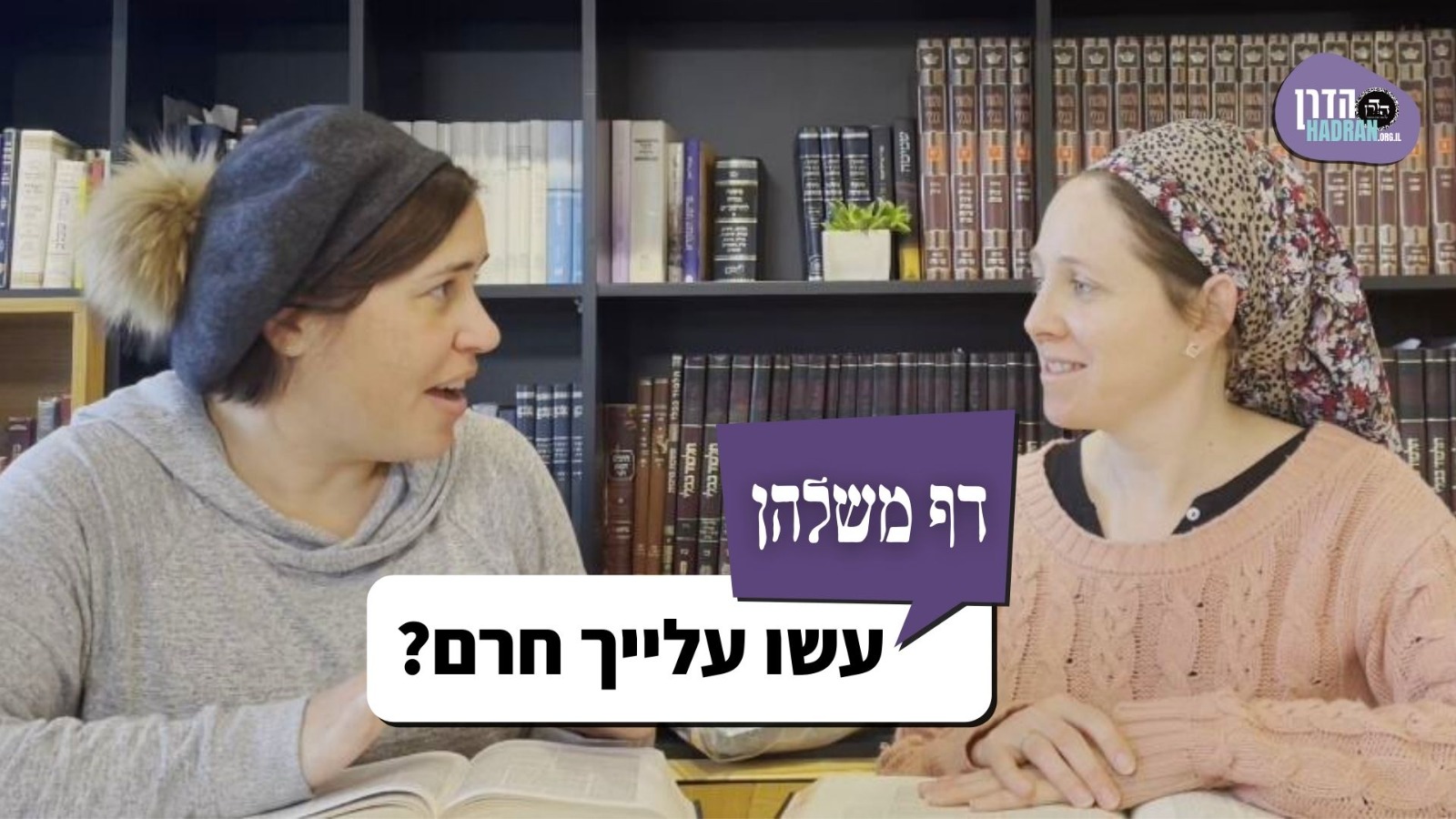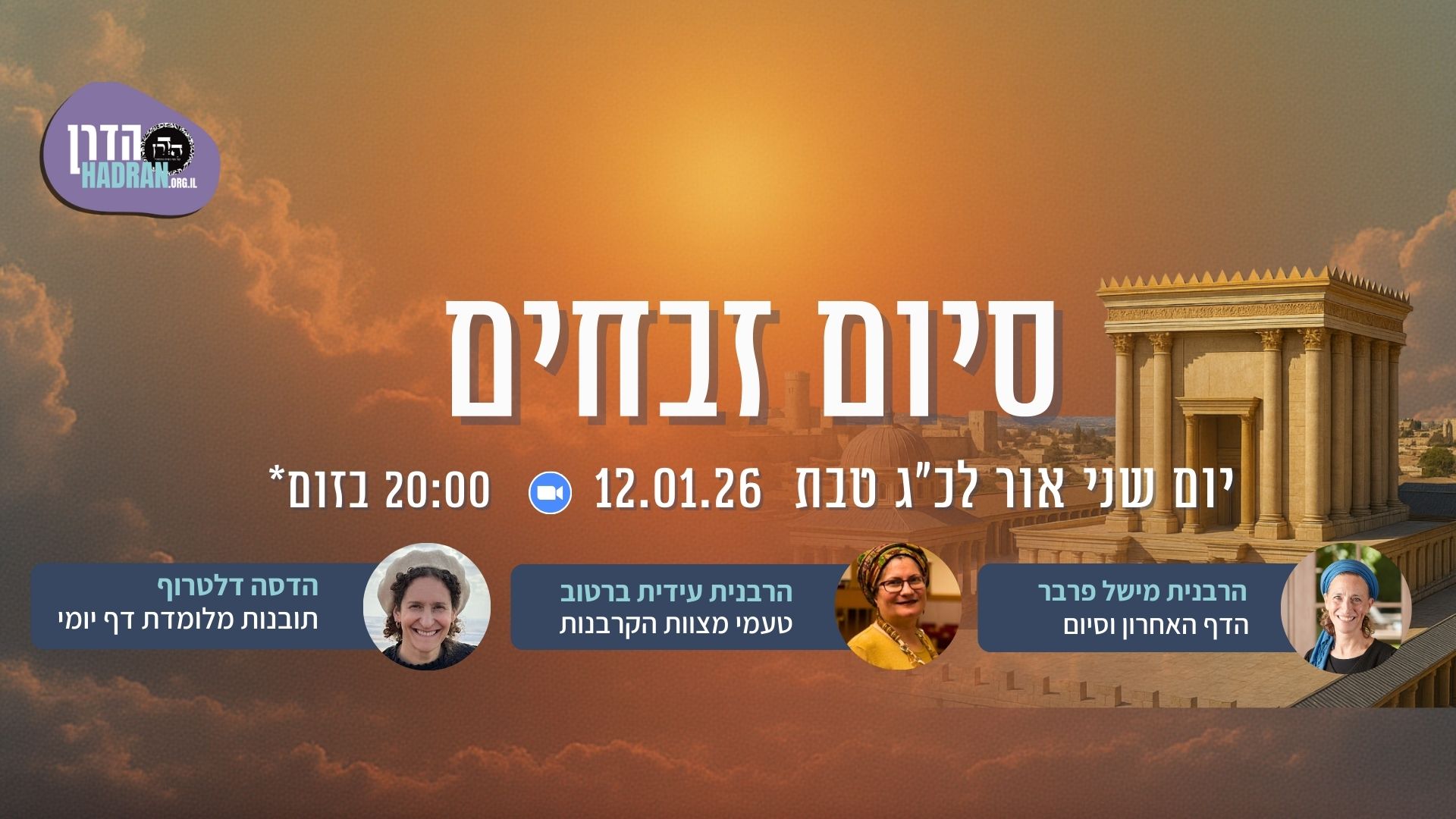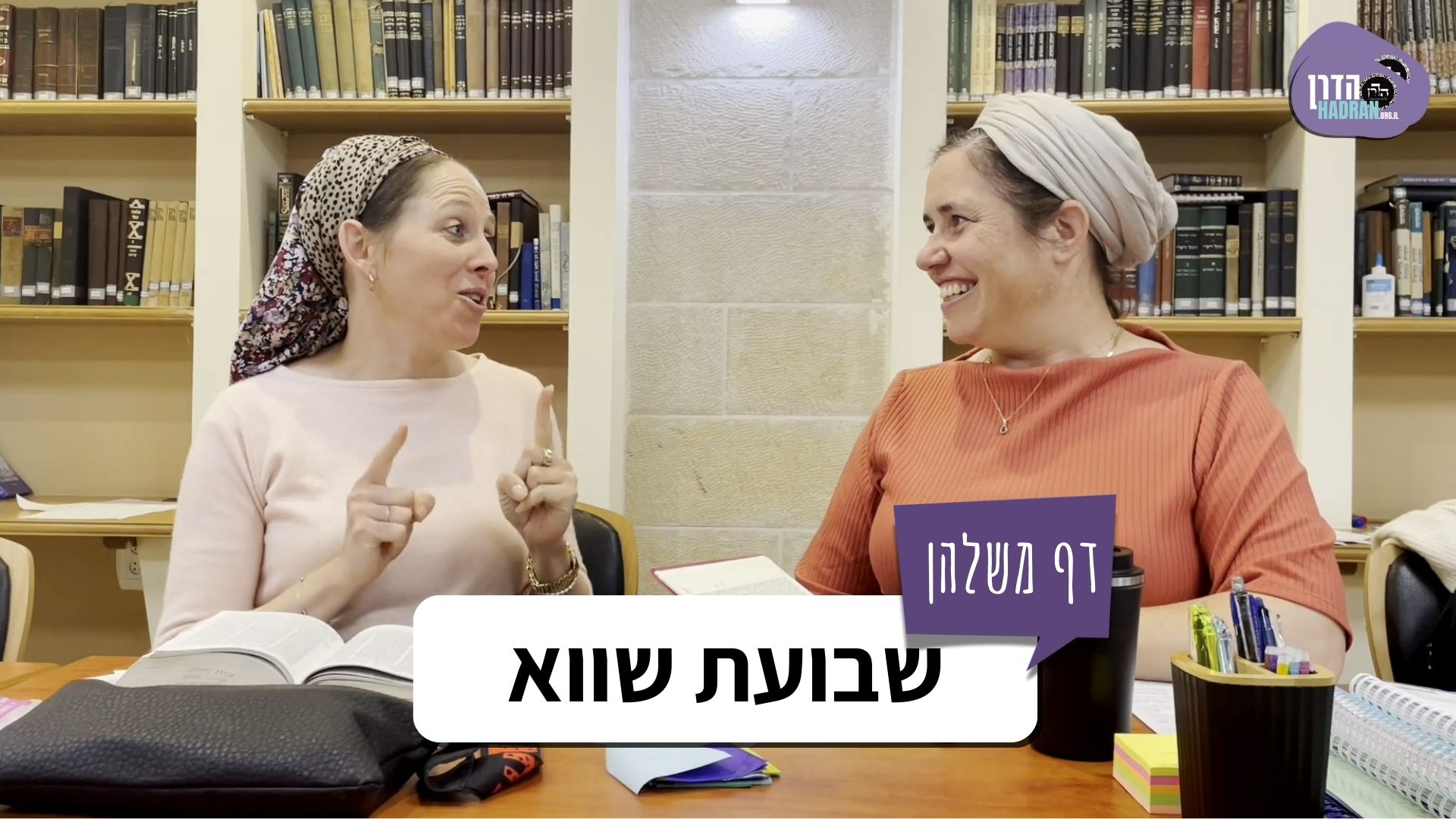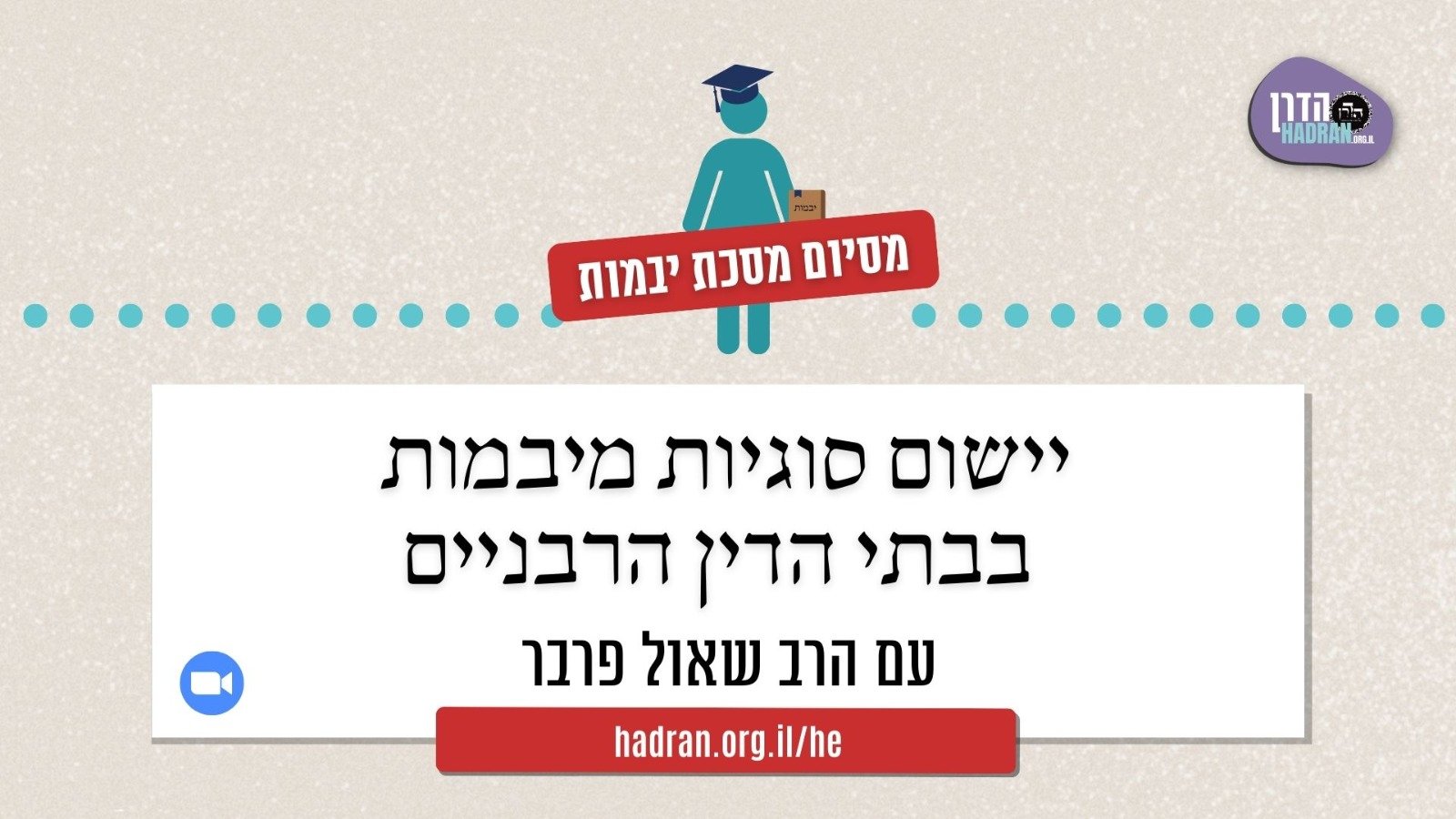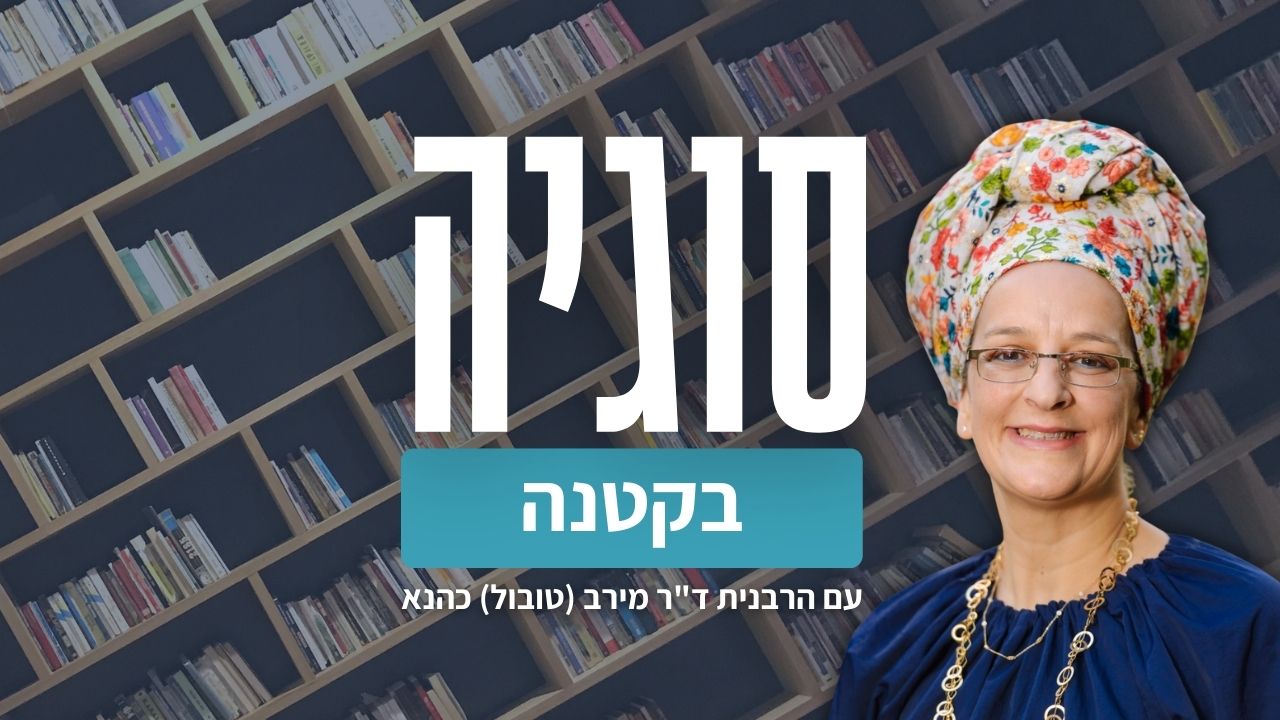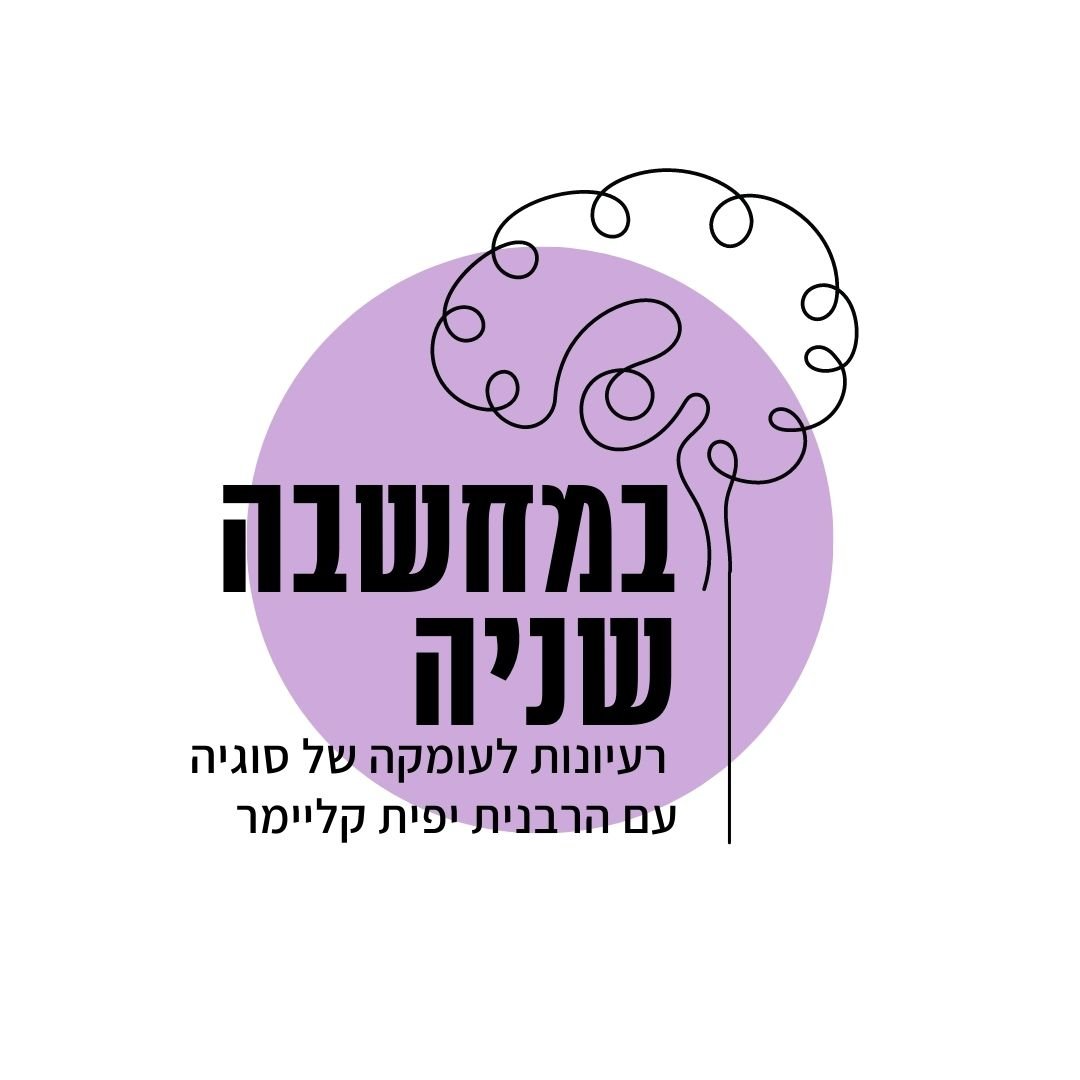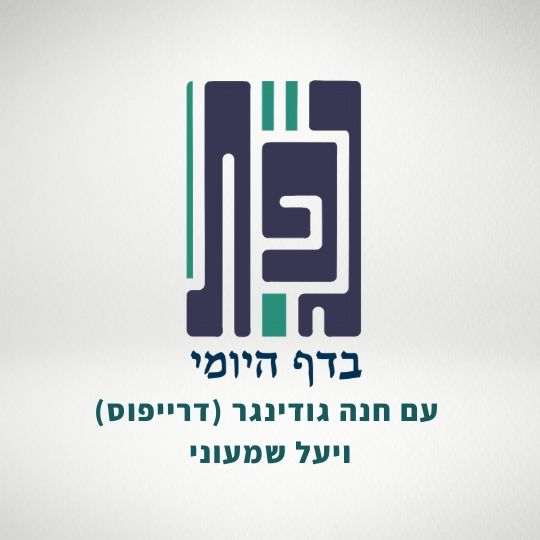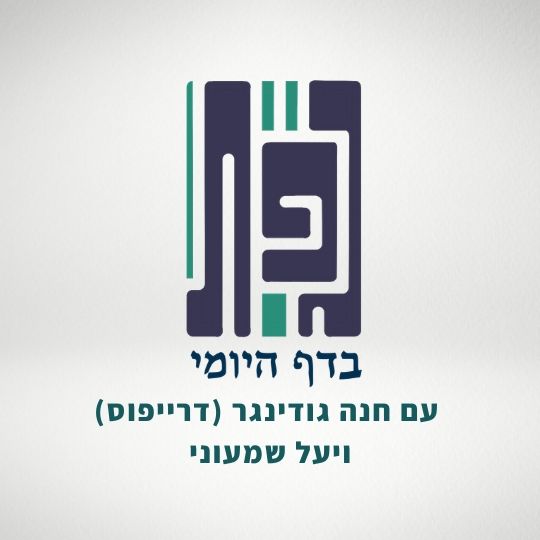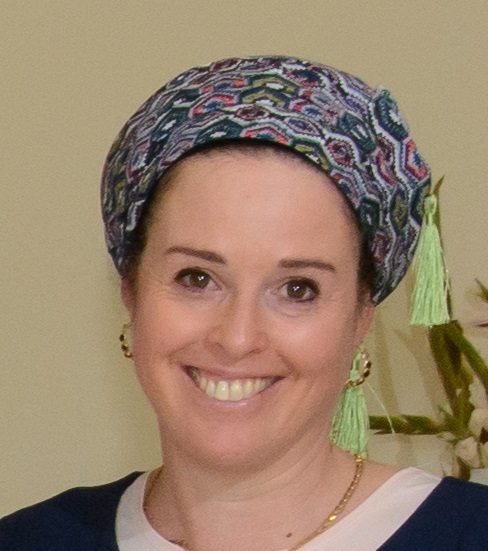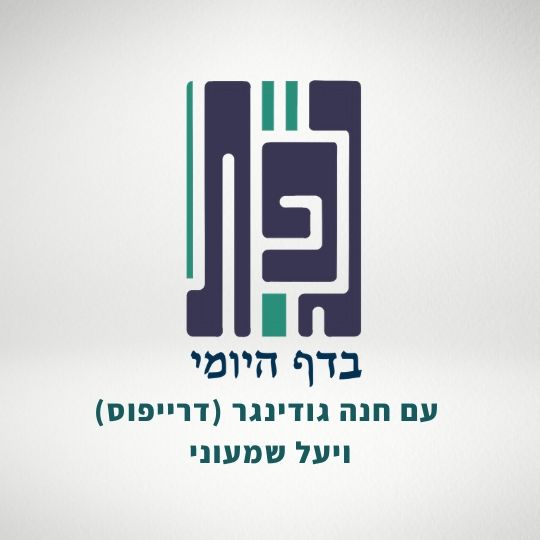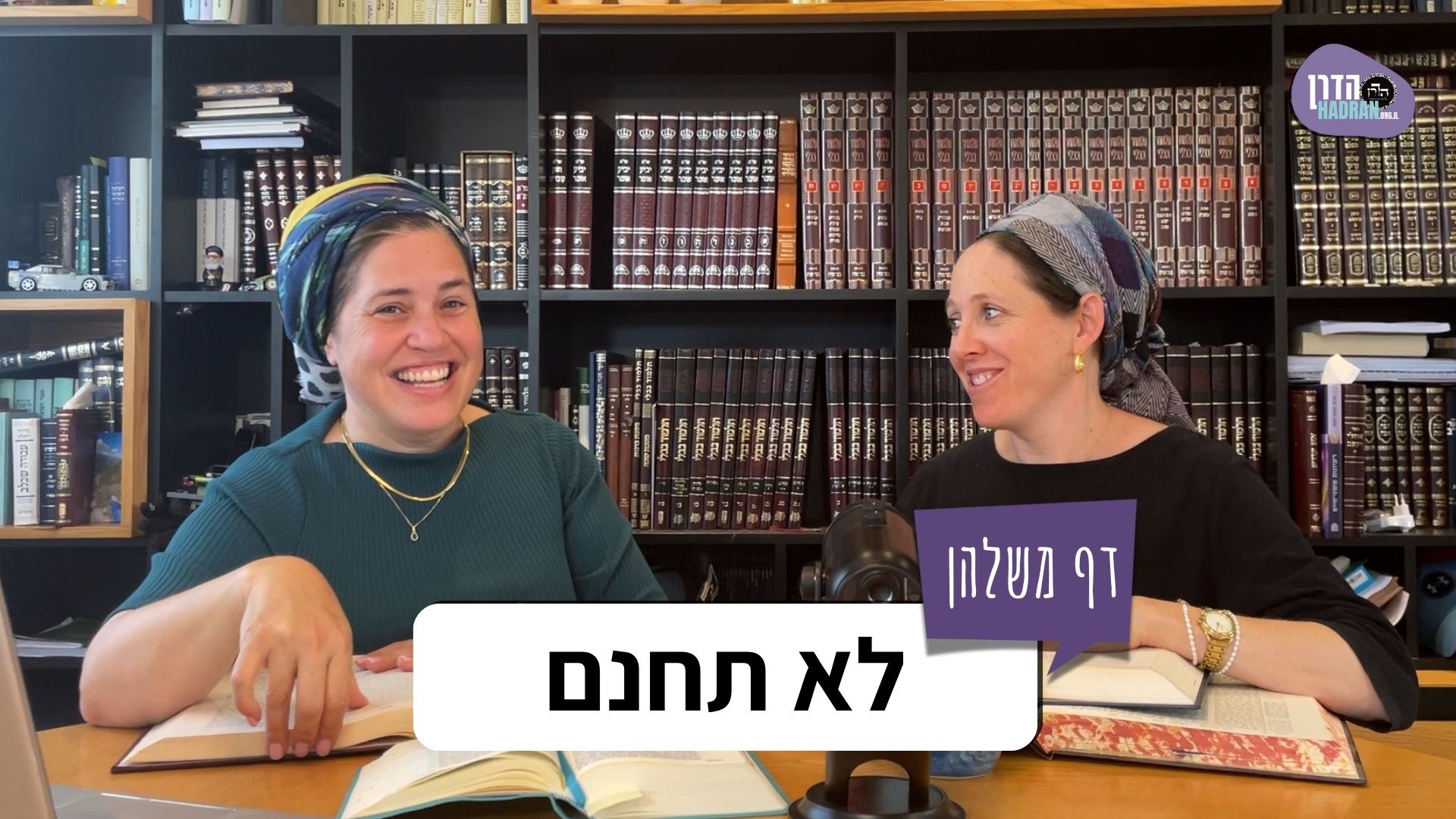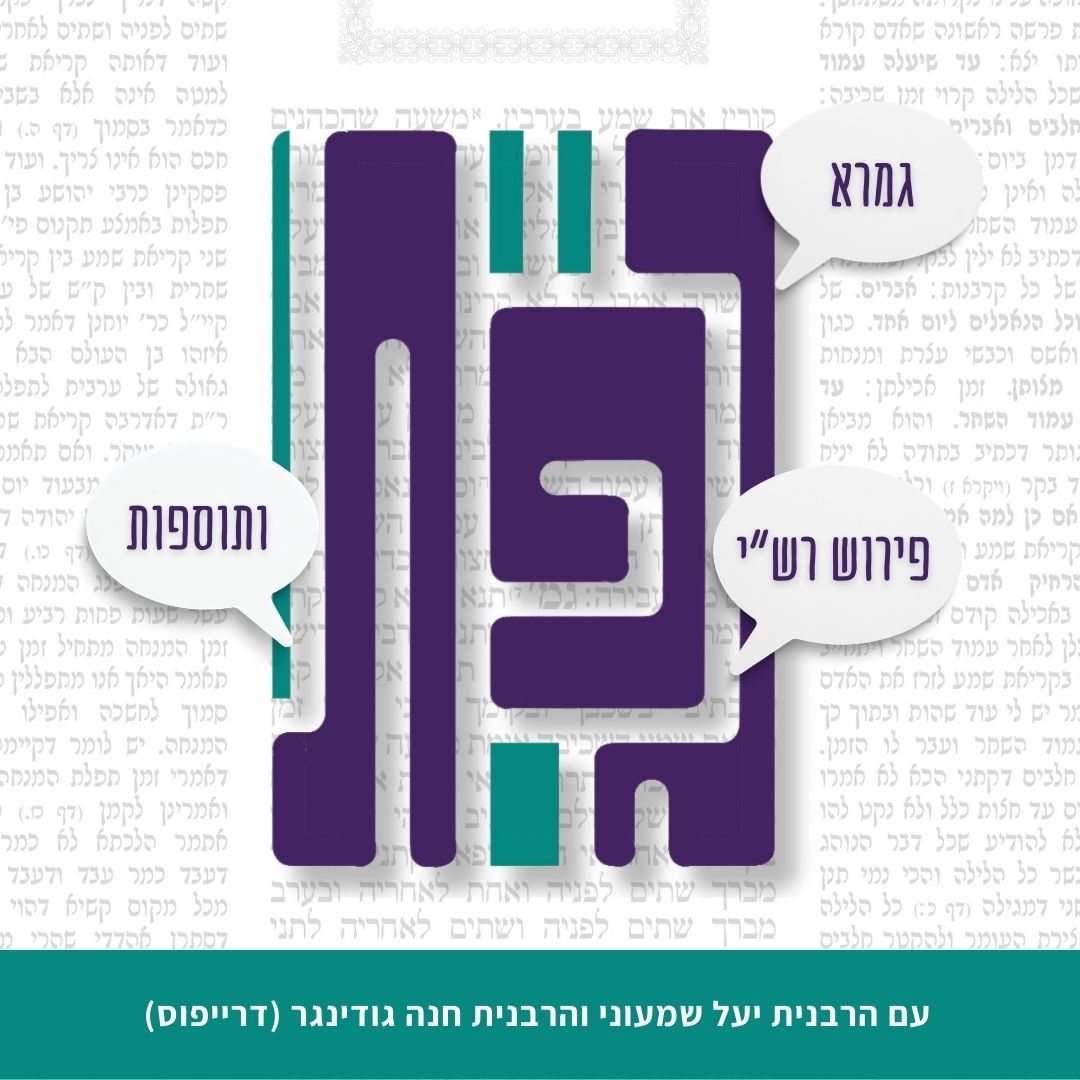דיונים סביב בישול כבד. האם אפשר לאכול אוכל פרווה רותח בקערה בשרי עם חלב? האם אפשר לחתוך מאכל עם סכין בשרי ולאכול אותו עם מאכל חלבי?
הלימוד השבוע מוקדש לזכות ולשלום הַיְימׇנוֹט אֱמוּנָה בַּת באנצ’י (קָסָאוּ) בת 11 שנעלמה במקום מגוריה בצפת, לפני שנתיים, ביום ט”ז אדר תשפ”ד (25.2.24), ולא נודעו עקבותיה.
הלימוד השבוע מוקדש למען ביטחון המדינה, החיילים והאזרחים, ולמען חירותו של העם האיראני. שנזכה בקרוב שיתקיים בנו הפסוק: "לַיְּהוּדִים הָיְתָה אוֹרָה וְשִׂמְחָה וְשָׂשֹׂן וִיקָר”.
הלימוד השבוע מוקדש לזכות וְלִשְׁלוֹם הָיימָנוֹט אֱמוּנָה בַּת באנצ’י (קָסָאוּ), בת 11 שנעלמה במקום מגוריה בצפת, לפני שנתיים, ביום ט”ז אדר תשפ״ד (25.2.24), ולא נודעו עקבותיה. אנו מתפללים שֶׁתִּמָּצֵא וְתוּשַׁב לביתה במהרה!
רוצה להקדיש שיעור?

כלים
הלימוד השבוע מוקדש לזכות ולשלום הַיְימׇנוֹט אֱמוּנָה בַּת באנצ’י (קָסָאוּ) בת 11 שנעלמה במקום מגוריה בצפת, לפני שנתיים, ביום ט”ז אדר תשפ”ד (25.2.24), ולא נודעו עקבותיה.
הלימוד השבוע מוקדש למען ביטחון המדינה, החיילים והאזרחים, ולמען חירותו של העם האיראני. שנזכה בקרוב שיתקיים בנו הפסוק: "לַיְּהוּדִים הָיְתָה אוֹרָה וְשִׂמְחָה וְשָׂשֹׂן וִיקָר”.
הלימוד השבוע מוקדש לזכות וְלִשְׁלוֹם הָיימָנוֹט אֱמוּנָה בַּת באנצ’י (קָסָאוּ), בת 11 שנעלמה במקום מגוריה בצפת, לפני שנתיים, ביום ט”ז אדר תשפ״ד (25.2.24), ולא נודעו עקבותיה. אנו מתפללים שֶׁתִּמָּצֵא וְתוּשַׁב לביתה במהרה!
כלים
העמקה
רוצה להבין מה באמת קורה מתחת לפני השטח של הסוגיה?
שיעורים, פודקאסטים והרחבות של מיטב המורות שלנו יפתחו לך עוד זוויות וכיווני חשיבה.
חדשה בלימוד הגמרא?
זה הדף הראשון שלך? איזו התרגשות עצומה! יש לנו בדיוק את התכנים והכלים שיעזרו לך לעשות את הצעדים הראשונים ללמידה בקצב וברמה שלך, כך תוכלי להרגיש בנוח גם בתוך הסוגיות המורכבות ומאתגרות.
פסיפס הלומדות שלנו
גלי את קהילת הלומדות שלנו, מגוון נשים, רקעים וסיפורים. כולן חלק מתנועה ומסע מרגש ועוצמתי.
חולין קיא
ומשום שמנוניתא משום דמא מאי
And the other food is not forbidden due to the liver’s blood, but rather due to the fat of the liver it absorbed. But if permitted liver is cooked with another piece of meat, and the concern is only that the meat might be prohibited due to the meat absorbing excess blood from the liver, what is the halakha? Perhaps blood is absorbed less easily than fat.
כי הדר סליק אשכחיה לר’ זריקא אמר ליה האי נמי לא תבעי לך דאנא וינאי בריה דרבי אמי איקלען לבי יהודה בריה דר’ שמעון בן פזי וקריבו לן קניא בקופיה ואכלנא
When Rav Safra again ascended to Eretz Yisrael, he found Rabbi Zerika once more and asked him about liver cooked with another piece of meat. Rabbi Zerika said to him: You need not ask this question either, as I and Yannai, son of Rabbi Ami, arrived at the house of Yehuda, son of Rabbi Shimon ben Pazi, and they brought before us the windpipe of an animal with all the parts attached to it, i.e., the lungs, heart, and liver, all of which had been cooked together, and we ate it. This proves that the blood emitted from the liver does not render prohibited other pieces of meat cooked with it.
מתקיף לה רב אשי ואיתימא ר’ שמואל מזרוקיניא ודלמא פי קנה חוץ לקדרה הוה אי נמי מיחלט הוה חליט ליה מעיקרא כי הא דרב הונא חלטי ליה בחלא ורב נחמן חלטי ליה ברותחין
Rav Ashi, and some say Rabbi Shmuel from Zerokinya, objects to this conclusion: But perhaps in that incident the mouth of the windpipe was positioned outside of the pot, allowing the liver’s excess blood to run out of the pot rather than being absorbed by the other pieces of meat. Alternatively, perhaps they poured boiling liquid on the liver at the outset, before it was cooked with the lung and heart, like that custom of Rav Huna, for whom they would pour boiling vinegar on liver, and that of Rav Naḥman, for whom they would pour boiling water on liver. This would cook the excess blood into the liver and prevent it from diffusing into the other pieces. Abaye’s question remains unresolved.
וסבר רב פפא קמיה דרבא למימר חלא אסיר אמר ליה אי חלא אסיר איהו נמי אסיר כי היכי דפליט הדר בלע
And with regard to the pouring of boiling vinegar on the liver, Rav Pappa, when he was a student before Rava, thought to say that the vinegar becomes prohibited for consumption in the process, since it absorbs blood from the liver. Rava said to Rav Pappa: If you claim that the vinegar is prohibited, then the liver itself should also be prohibited, since just as the liver expels blood and prohibits the vinegar, so too it then absorbs the blood back from the forbidden vinegar. Rather, one must say that no blood is expelled from the liver during this process at all, which is why the liver is permitted afterward.
רב בר שבא איקלע לבי רב נחמן אייתו ליה כבדא שליקא ולא אכל אמרו ליה בר בי רב דלגיו לא אכיל ומנו רב בר שבא אמר להו רב נחמן גאמו לשבא
The Gemara relates that Rav bar Shabba visited the house of Rav Naḥman. They brought him cooked liver, but Rava bar Shabba did not partake of it. The members of the household said to Rav Naḥman: There is a student of Torah inside who is not eating. And who is he? Rav bar Shabba. Rav Naḥman said to them: Feed Shabba against his will.
כתנאי ר’ אליעזר אומר הכבד אוסרת ואינה נאסרת מפני שפולטת ואינה בולעת ר’ ישמעאל בנו של ר’ יוחנן בן ברוקה אומר מתובלת אוסרת ונאסרת שלוקה אוסרת ונאסרת
The Gemara notes: Abaye’s question above with regard to liver cooked with other meat is subject to a dispute between tanna’im, as it is taught in a baraita: Rabbi Eliezer says: The liver that was cooked with other pieces of meat prohibits them, but it itself is not prohibited, because it expels blood as it cooks but does not absorb it again. Rabbi Yishmael, son of Rabbi Yoḥanan ben Beroka, says: If the liver was spiced when cooking, it prohibits the other meat and it becomes prohibited as well, as the spices cause the liver to reabsorb the blood that was expelled. Likewise, if the liver was stewed, i.e., heavily cooked, it renders the other pieces prohibited and is itself prohibited.
רבה בר רב הונא אקלע לבי רבה בר רב נחמן אייתי לקמיה תלת סאוי טחאי אמר להו מי הוה ידעיתו דאתינא אמרו ליה מי עדיפת לן מינה דכתיב (ישעיהו נח, יג) וקראת לשבת עונג
The Gemara relates: Rabba bar Rav Huna visited the house of Rabba bar Rav Naḥman and dined with him on Shabbat. They brought before him three se’a of fine bread that had been kneaded in oil and honey. Rabba bar Rav Huna said to the members of Rabba bar Rav Naḥman’s household: Did you know that I was coming, that you prepared such superior food? They said to him: Are you more distinguished than Shabbat, as it is written with regard to Shabbat: “If you proclaim Shabbat a delight, the sacred day of God honored” (Isaiah 58:13).
אדהכי אשכח ההוא כבדא דהוה בה סמפונא דבליעא דמא אמר להו אמאי עבדיתו הכי אמרו ליה אלא היכי נעביד אמר להו קרעו שתי וערב וחיתוכא לתחת
Meanwhile, Rabba bar Rav Huna found among the dishes before him a certain liver that contained an artery suffused with blood. He said to the members of the household: Why do you do this? Although the blood absorbed in the liver is permitted, that which is collected in the blood vessels is prohibited. The members of the household said to him: Rather, what should we do in order to prepare the liver? Rabba bar Rav Huna said to them: First tear the liver lengthwise and widthwise, and position the side with the tear downward, so that the blood will flow out when you place it on the fire.
וה”מ כבדא אבל טחלא שומנא בעלמא הוא כי הא דשמואל עבדי ליה תבשילא דטחלי ביומא דעביד מלתא
The Gemara comments: And this statement applies only to liver, due to the blood that collects in its blood vessels; but there is no need to tear the spleen in this manner, as it merely contains fat. And this ruling accords with that which is reported about Shmuel, that his attendants would prepare a dish of spleens for him on the day that he performed the practice of bloodletting.
אתמר כבדא עילוי בשרא שרי דמא משרק שריק כחלא עילוי בשרא אסור מאי טעמא חלב סרוכי מסריך
§ It was stated: If liver and other meat are roasted on spits in an oven such that the liver is positioned on top of the meat, the meat is permitted even though blood from the liver flows onto it. This is because the blood that flows from an item roasting in the oven slides over meat located underneath it and is not absorbed. But if an udder is positioned on top of the meat when roasted in the oven, the meat is prohibited. What is the reason? It is that the milk expelled by the roasting udder adheres to and is absorbed by the meat.
רב דימי מנהרדעא מתני אפכא כחלא עילוי בשרא שרי מ”ט חלב שחוטה דרבנן כבדא עילוי בשרא אסור דם דאורייתא
Rav Dimi from Neharde’a would teach the opposite: Whenever an udder is positioned on top of the meat, the meat is permitted. What is the reason? The prohibition of meat cooked in milk of a slaughtered animal applies by rabbinic law, and is treated less stringently. But if liver is positioned on top of the meat, the meat is prohibited, as the prohibition of blood applies by Torah law, and one must be concerned that perhaps the meat will absorb blood from the liver.
דרש מרימר הלכתא בין כבדא בין כחלא תותי בשרא שרי עילוי בשרא דיעבד אין לכתחלה לא
Mareimar taught in public: The halakha is: Whether in the case of liver or in the case of an udder, if it is underneath the meat, the meat is permitted, but if it is on top of the meat, then after the fact, yes, the meat is permitted, but ab initio, no, one may not situate them in this manner.
רב אשי איקלע לבי רמי בר אבא חמוה חזייה לבריה דרמי בר אבא דקא
The Gemara relates: Rav Ashi arrived at the house of his father-in-law Rami bar Abba, and he saw that the son of Rami bar Abba was
שפיד כבדא עילוי בשרא אמר כמה יהיר האי מרבנן אימר דאמור רבנן דיעבד לכתחלה מי אמור
skewering liver on top of meat for roasting. Rav Ashi said: How haughty is this Sage! Even if you say that the Sages stated that one may eat meat roasted under liver after the fact, did they say that one may roast them in this manner ab initio?
ואי איכא בי דוגי בשרא עילוי כבדא נמי אסיר
The Gemara adds: And if there is a receptacle under the spit for the drippings of fat, then even if the meat is on top of the liver it is also prohibited to roast the meat, as the blood from the liver will fall into the fat in the vessel, and one might come to eat the mixture.
ומ”ש מדמא דבשרא דמא דבשרא שכן דמא דכבדא קפי
The Gemara asks: And in what way is this case different from roasting a piece of meat by itself over such a vessel, which is permitted? Here too the blood of the meat drips into the fat in the vessel. The Gemara answers: Blood of most meat sinks to the bottom of the vessel, while the fat floats on top. Since the fat can be separated from the blood, it is permitted. By contrast, the blood of the liver floats above the fat and cannot be removed from it, and therefore the entire mixture is prohibited.
אמר רב נחמן אמר שמואל סכין ששחט בה אסור לחתוך בה רותח צונן אמרי לה בעיא הדחה ואמרי לה לא בעיא הדחה
§ Rav Naḥman says that Shmuel says: The knife with which one slaughtered an animal absorbs blood due to its heat, and it is therefore prohibited to cut any boiling food with it, since that food will in turn absorb the blood from the knife. If one cut cold food with this knife, some say that the piece he cut requires rinsing before one may eat it, and some say that it does not require rinsing.
אמר רב יהודה אמר שמואל קערה שמלח בה בשר אסור לאכול בה רותח ושמואל לטעמיה דאמר שמואל מליח הרי הוא כרותח וכבוש הרי הוא כמבושל
§ The Gemara cites other statements of Shmuel. Rav Yehuda says that Shmuel says: With regard to a bowl in which meat was salted to remove its blood before cooking, it is prohibited to eat any boiling food placed in it, as that food absorbs blood of the meat from the bowl. And in this Shmuel conforms to his standard line of reasoning, as Shmuel said: A salted food imparts its flavor like a boiling food, and a food item marinated in vinegar, brine, or the like absorbs flavor from the liquid or vessel as would a cooked food.
כי אתא רבין א”ר יוחנן מליח אינו כרותח וכבוש אינו כמבושל אמר אביי הא דרבין ליתא דההיא פינכא דהוה בי ר’ אמי דמלח ביה בשרא ותבריה מכדי רבי אמי תלמיד דר’ יוחנן הוה מאי טעמא תבריה לאו משום דשמיעא ליה מיניה דר’ יוחנן דאמר מליח הרי הוא כרותח
When Ravin came from Eretz Yisrael to Babylonia he said that Rabbi Yoḥanan said: A salted food is not considered like a boiling food, and a marinated food is not considered like a cooked food. Abaye said: I can prove that this ruling that Ravin cited is not correct, as there was a certain bowl [pinka] in Rabbi Ami’s house in which meat was salted, and Rabbi Ami broke it so that it would no longer be used. Now Rabbi Ami was a student of Rabbi Yoḥanan. What is the reason he broke that bowl? Is it not because he heard that Rabbi Yoḥanan said: A salted food is considered like a boiling food? Ravin’s citation was evidently in error.
יתיב רב כהנא אחוה דרב יהודה קמיה דרב הונא ויתיב וקאמר קערה שמלח בה בשר אסור לאכול בה רותח וצנון שחתכו בסכין מותר לאכלו בכותח
Rav Kahana, the brother of Rav Yehuda, sat before Rav Huna, and he sat and said: With regard to a bowl in which meat was salted, it is prohibited to eat any boiling food placed in it. And he added: With regard to a radish that one cut with a knife used for cutting meat, it is permitted to eat it with kutaḥ, a food that contains milk, even though the sharpness of the radish causes it to absorb the fat of the meat from the knife.
מאי טעמא אמר אביי האי היתרא בלע והאי איסורא בלע
The Gemara asks: What is the reason to distinguish between blood absorbed in a bowl and fat absorbed by the radish? Abaye said: This radish absorbed a permitted substance, as the fat on the knife is permitted for consumption by itself, but that bowl in which meat was salted absorbed a prohibited substance, i.e., blood.
א”ל רבא כי בלע היתרא מאי הוי סוף סוף האי היתרא דאתי לידי איסורא הוא דאיסורא קאכיל אלא אמר רבא האי אפשר למטעמיה והאי לא אפשר למטעמיה
Rava said to Abaye: And if the radish absorbed a permitted substance, what of it? Ultimately, if one desires to eat the radish with kutaḥ, it is a permitted substance that leads to a prohibition, as he will eat a prohibited substance. Rather, Rava said: The distinction is that with regard to this radish, it is possible for a Jew to taste it before eating it with milk to see if it has acquired the flavor of meat. But with regard to that bowl, it is not possible for a Jew to taste its contents to see whether they have absorbed blood.
א”ל רב פפא לרבא וליטעמיה קפילא ארמאה מי לא תנן קדרה שבישל בה בשר לא יבשל בה חלב ואם בשל בנותן טעם בשל בה תרומה לא יבשל בה חולין ואם בשל בנותן טעם
Rav Pappa said to Rava: But let a gentile cook taste the contents of the bowl to see whether they have the taste of blood. Didn’t we learn in the Tosefta (Terumot 8:12): With regard to a pot in which one cooked meat, one may not cook milk in it, and if he cooked milk in it, the meat absorbed in the pot renders the milk forbidden if it imparts flavor to the milk. Likewise, if one cooked teruma in the pot, he may not cook non-sacred food in it, and if he cooked non-sacred food in it, the non-sacred food is prohibited if there is sufficient teruma absorbed in the pot to impart flavor to the non-sacred food.
ואמרינן בשלמא תרומה טעים לה כהן אלא בשר בחלב מאן טעים לה ואמר לן ליטעמיה קפילא ה”נ ליטעמיה קפילא ה”נ כי קאמינא דליכא קפילא:
And we said with regard to this baraita: Granted, one can know whether the non-sacred food has acquired the flavor of teruma, as a priest can taste it. But with regard to the prohibition of meat cooked in milk, who can taste it? And you, Rava, said to us: Let a gentile cook taste it. So too here, with regard to the food in the bowl, let a gentile cook taste it. Rava responded: Indeed, a gentile cook can discover whether the food in the bowl has absorbed the taste of blood. When I said my statement I was referring to a case where there is no gentile cook available.
איתמר דגים שעלו בקערה רב אמר אסור לאכלן בכותח ושמואל אמר מותר לאכלן בכותח
§ It was stated: If a fish was removed from the fire and placed, still hot, in a bowl in which meat had been eaten, Rav says: It is prohibited to eat the fish with the milk dish kutaḥ, since the fish has absorbed meat from the bowl. And Shmuel says: It is permitted to eat the fish with kutaḥ.
רב אמר אסור נותן טעם הוא ושמואל אמר מותר נותן טעם בר נ”ט הוא
The Gemara explains: Rav says that it is prohibited to eat the fish with kutaḥ because this is a case of imparted flavor, i.e., from the meat to the fish. And Shmuel says that it is permitted because the flavor is first imparted to the bowl, and only then from the bowl to the fish. This is therefore a case of imparted flavor derived from imparted flavor.
והא דרב לאו בפירוש איתמר אלא מכללא איתמר דרב איקלע לבי רב שימי בר חייא בר בריה חש בעיניו עבדו ליה שייפא בצעא בתר הכי רמו ליה בשולא בגווה טעים ליה טעמא דשייפא אמר יהיב טעמא כולי האי ולא היא שאני התם דנפיש מררה טפי
The Gemara notes: And this opinion of Rav was not stated explicitly; rather, it was stated by inference. As Rav arrived at the house of Rav Shimi bar Ḥiyya, the son of his son. He felt pain in his eyes, and they prepared for him an ointment in an earthenware bowl as a remedy. Later they placed a dish for him in that same bowl. Rav tasted in that dish the flavor of the ointment and said: It imparts so much flavor! Those present inferred that according to Rav, imparted flavor derived from imparted flavor is strong enough itself to impart flavor. The Gemara rejects this: But that is not so, and one cannot reach any general conclusions from this story. It is different there, as the ointment was very bitter.
רבי אלעזר הוה קאים קמיה דמר שמואל אייתו לקמיה דגים שעלו בקערה וקא אכיל בכותח יהיב ליה ולא אכל א”ל לרבך יהיבי ליה ואכל ואת לא אכלת אתא לקמיה דרב א”ל הדר ביה מר משמעתיה א”ל חס ליה לזרעיה דאבא בר אבא דליספי לי מידי ולא סבירא לי
The Gemara relates: Rabbi Elazar was standing before Mar Shmuel, and they brought before Shmuel a fish that had been removed directly from the fire and placed into a bowl used previously for meat, and he ate it together with kutaḥ. Shmuel gave Rabbi Elazar some of this dish, but Rabbi Elazar did not eat it, as he was a student of Rav, who prohibited such mixtures. Shmuel said to him: To your teacher, Rav, I gave this dish and he ate from it, yet you will not eat? Later Rabbi Elazar came before Rav, and said to him: Did the Master retract this halakha? Do you permit this? Rav said to him: God forbid that the progeny of Abba bar Abba, i.e., Shmuel, would feed me something that I do not hold to be permitted. Shmuel never fed me such a dish.
רב הונא ורב חייא בר אשי הוו יתבי חד בהאי גיסא דמברא דסורא וחד בהאי גיסא דמברא למר אייתו ליה דגים שעלו בקערה ואכל בכותח למר אייתו ליה תאנים וענבים בתוך הסעודה ואכל ולא בריך
The Gemara relates that Rav Huna and Rav Ḥiyya bar Ashi were sitting down to eat. One of them was sitting on this side of the ford of the Sura River, and the other one was sitting on that side of the ford. They brought one Sage a fish that had been removed from the fire and placed into a bowl previously used for meat, and he ate it together with kutaḥ. They also brought the other Sage figs and grapes during the meal, and he ate them but did not recite a separate blessing over them, even though these foods were usually consumed following the main portion of the meal before reciting Grace after Meals, and a separate blessing was made on them.
מר א”ל לחבריה יתמא עבד רבך הכי ומר א”ל לחבריה יתמא עבד רבך הכי מר א”ל לחבריה אנא כשמואל סבירא לי ומר א”ל לחבריה אנא כר’ חייא סבירא לי דתני ר’ חייא פת פוטרת כל מיני מאכל ויין פוטר כל מיני משקין
One Sage said to his colleague: Orphan! Student without a teacher! Would your teacher do this, i.e., eat such fish with kutaḥ? And the other Sage said to his colleague: Orphan! Would your teacher do this, i.e., eat these fruits during a meal without reciting a blessing over them? One Sage said to his colleague: I hold in accordance with the opinion of Shmuel, who permits eating such fish with kutaḥ. And the other Sage said to his colleague: I hold in accordance with the opinion of Rabbi Ḥiyya, as Rabbi Ḥiyya teaches: The blessing over the bread exempts all the other types of food eaten during a meal, including those usually eaten separately following bread, and likewise the blessing over wine exempts all types of drinks.
אמר חזקיה משום אביי הלכתא דגים שעלו בקערה מותר לאוכלן בכותח צנון שחתכו בסכין שחתך בה בשר אסור לאוכלו בכותח
Ḥizkiyya says in the name of Abaye: The halakha is: If a fish was removed from the fire and placed into a bowl used for meat, it is permitted to eat it together with kutaḥ. But with regard to a radish that one cut with a knife with which he had cut meat, it is prohibited to eat that radish with kutaḥ, contrary to Rav Kahana’s statement above.
וה”מ צנון
The Gemara notes: And this statement applies only to a radish,

